- Home
- Barry Lyga
Lucky Day Page 4
Lucky Day Read online
Page 4
Besides, wasn’t privacy dead, anyway, shot through the head by Google and Facebook?
Maybe, maybe not…but at the very least, it was on life support, and G. William planned to exploit that fact. He assembled a fairly thorough dossier on Weathers. Nothing jumped out at him. The man was living above his means—and there would be a reckoning for that someday—but hell: These days, who wasn’t? It wasn’t a crime to run up your credit cards.
No mysterious purchases. No strange phone calls, incoming or outgoing. He poked around some more, checking out Weathers’s recent travel. Maintenance on his car. Had he had it detailed lately? That kind of thing. He even followed him around a couple of nights, using his personal vehicle. Caution was his watchword—if he was caught, it would only give Weathers more ammo.
Nothing but nothing. Weathers was as boring as he was annoying.
That should have been the end of it.
Except that Doug Weathers had no alibi for the night before Samantha Reed’s body had been found.
Doesn’t mean anything. Hell, I don’t have an alibi for that night, ’less you count passed out on the sofa.
Half the Nod probably couldn’t account for its whereabouts that night. Innocent people rarely kept track of their comings and goings.
He kept up his one-man surveillance of Weathers. Borrowed a GPS tracker from a colleague in the next county over and slipped it into the wheel well of Weathers’s car. He couldn’t be on the man 24/7, but he could let a satellite do that for him. Sometimes these creeps revisited the scene of the crime.
A week went by. G. William began to feel faintly embarrassed, as if waking from a dream in which he’d walked naked through town, proudly displaying his manhood to one and all. Doug Weathers was a loathsome cockroach, yes, but he hadn’t done anything illegal. G. William was glad he’d never confided in anyone his suspicions.
They’d really think the old man’s lost it. Or, worse, they’d pity me. “Poor old G. William. Can’t catch the bad guy and needs something to do to feel useful.”
He recovered the GPS tracker and tried to put the whole shameful thing out of his mind.
The trail (trails, actually) had gone cold. He had no leads in either case. The physical evidence was so threadbare as to be meaningless.
On the one hand, he was grateful for the short, distractible nature of public memory. A movie star gets busted at the airport with a gram of coke or a young singer flashes the same nipples God gave every man, woman, and child alive, and suddenly gossip and chatter shift.
But on the other hand, the reprieve made him feel oily and sleazy. In a way, Doug Weathers was the only person holding his feet to the fire.
And they should be held to the fire. I’m the one responsible. I’m the one who should be killing himself to avenge these girls.
Once, maybe. But it seemed pointless now. He had no leads. Nothing to sink his teeth into, nothing to peel back. No secrets to ferret out.
Maybe—the thought galled and soothed at the same time—it was time to give up.
Let the next guy worry about Dead Girl One and Dead Girl Two.
It was sounding better and better every day. Leave office humiliated, under a cloud? There were worse fates. He’d witnessed them up close—Joyce in her hospice bed, Samantha Reed in her ditch. He’d be getting off easy.
Sure, he thought, staring at the pristine, still-made bed after another night on the sofa. Sure, why not?
And he thought that way for at least a week, and his mood lifted the tiniest bit, and he missed Joyce just the smallest, most infinitesimal amount less, until the day Hanson walked past him in the hall at the sheriff’s office and commented, “They’ll let anyone say whatever they want, won’t they?”
“What the hell’s that mean, Hanson?”
Hanson—predictably, fully in character—blanched. “I…I thought you knew.…”
Doug Weathers—no longer the darling of the front page—had taken to the Internet to continue his haranguing of the Lobo’s Nod sheriff’s department. His new blog—Stormy Weathers, of course—began with a blistering critique of the department in general and of G. William in particular. DEAD GIRLS GET NO JUSTICE!!! the first post’s headline proclaimed. Exclamation points were used in fulsome abundance, as though Weathers’s editors had been holding his exclamatory prowess in check and he could now let loose. A typical sentence read: “With no leads and no information forthcoming, is it possible the sheriff’s department has simply…given up???” The triple question marks no doubt lending gravitas and urgency, in Weathers’s mind.
“Sheriff G. William Tanner has presided over decades of relative calm in Lobo’s Nod…but it’s now obvious that his reign was more luck than genius! At the first sign of REAL crime, the sheriff has tucked his tail between his legs! Given up! The killer or killers of Cara Swinton and Samantha Reed are STILL AT LARGE!!!”
G. William skimmed the rest of the post at his desk in disgust. It was easy to fulminate from the sidelines, much harder to do the actual work. If he’d had even a smidgen of evidence, so much as a soupçon of information, he would be bloodhounding it all over the goddamn county—the state!—in pursuit of the men who’d done wrong by Dead Girl One and Dead Girl Two. But he had nothing. It happened. There were rooms in every police station in every precinct in every state in God’s great US of A in which cold cases languished, unattended and unsolved. The Nod was no exception.
And for that jackass to take to the Internet, to excoriate G. William on his blog…
G. William even hated the word. Blog. It wasn’t a real word. It was more like a comic-book sound effect. It was something that lived and thrived in a word balloon as an anthropomorphic cat hacked up the still-living birdie protagonist in a kid’s cartoon.
BLLLLOOOOOOOOGGGG!!!!
He hated the blog. He hated Weathers. But at least someone still cared. It seemed entirely possible—entirely likely, really—that G. William would slip away into the vacant electoral night that gloams for all losers, that he would suffer early retirement and not much else for the sin of being unable to solve the murders of Dead Girl One and Dead Girl Two. That wasn’t right. There should be more.
As if losing your wife ain’t enough?
In the closed-door privacy of his office, G. William tightened his eyes against tears. The idea that Joyce’s death was some kind of advance payment on his to-be-overdue loan in the murder department was repugnant to him, but also somehow sensible and comfortable.
Makes perfect sense. Perfectly healthy woman, not too advanced in years, gets diagnosed and dies within six months…gotta be You, O Lord. Only You have that kind of power and foresight. Only You have that sick sense of humor, that sense of irrational and disproportionate retribution. Moses dies within sight of the Promised Land. King David counts his soldiers, and You smite seventy thousand innocents. I give up on two cases no one could solve, so you whack my wife in advance. Screw You, O Lord.
He wiped away the tears that had leaked through, then found himself staring at the handkerchief he’d used. He’d been using one just like it for years: Joyce regularly gifted him with handkerchiefs she’d monogrammed herself. No Internet-bought specialties for her.
The handkerchief was checkered and slightly damp with his tears, and the W was unraveling just the tiniest bit. One corner had frayed.
A dozen handkerchiefs usually took G. William through flu and allergy season and well past winter, at which point, Joyce would magically produce new ones, discarding the old ones.
The thread on the W stood up perhaps a quarter of an inch. It towered, in G. William’s eyes.
There would be no more handkerchiefs. This was the end of them.
He folded it with scrupulous caution and tucked it into his breast pocket. He would have to be careful with the ones he had left. Very careful, indeed.
October wound down toward Halloween, toward Election Day. Every day, G. William made sure to take an hour—either at the office or at home—to pore over the case files for Dea
d Girl One and Dead Girl Two. No matter how many times he read through them, though, nothing new appeared to him.
If the polling trend lines continued their current slopes, G. William would be a lame duck come the first Wednesday in November, just two weeks away. And he had no earthly idea what he would do in that case.
Sometimes, home in the living room, swaddled in darkness save for the TV, he hoisted up a roll of belly and slid his service weapon from its holster, holding it aloft in the lonely, sickly glow of the TV. You eat your gun, your problems go away. It’s the most basic, simplistic solution there is. It resolves everything.
There were no kids to traumatize with Daddy’s death. No living family. A handful of friends, yes, but most of them had been Joyce’s and had drifted away since her death. Not much of a reason to not off oneself.
Still. It pissed him off to think that his own death investigation would be handled by the Upstart from Calverton. And probably bungled. Every time he considered the gun, he tucked it back away, safe and sound.
He was pretty sure everyone who eventually offed himself did the same thing. Many, many times.
Chapter 6
With about a week to go before the election, the race was a statistical dead heat. Incumbents of the sheriff’s office traditionally did not campaign, which was good for G. William—he’d added even more weight to his bulk. His color was sallow, except for strained blooms of red on his cheeks and his usual florid nose. He wheezed when he stood, when he sat, when he walked more than thirty feet at a stretch. If the people of the Nod and the surrounding county hadn’t already lost faith in him, they would have if he’d had to attend campaign events. Just the sight of him would have dropped his chances at reelection straight into the toilet.
The final indignity (well, he reasoned, the penultimate indignity) came exactly one week before the race, when Tommy Shanahan called to give him a heads-up that the morning paper would carry its editorial endorsement. G. William didn’t bother to ask for whom. He’d been expecting this, and thanked Tommy—with genuine gratitude—for the warning.
“At least Weathers isn’t riding you anymore,” Tommy said weakly.
In the pages of the paper, sure. But that blog was still out there, and even though he knew he shouldn’t, G. William checked in regularly.
Failure…!
Blight on the Sheriff’s Office…!
Untenable…!
Violation of the public trust…!
He read the case files over and over, to the point that he could recite them from memory. They were the only proof he had that his memory was even functioning these days—he’d worn mismatched socks, the wrong tie with his uniform, a pajama top under his shirt. His brain fired at random, it seemed, to the point that he made sure to come to work long before the morning commuters took to the streets and long after the evening drivers were off the roads.
He didn’t trust himself behind the wheel. His mind drifted. Yet he couldn’t stop himself from coming into the office each day, huddling at his desk behind a closed door, looking for something—anything—that could lead to a break in either case.
Some days, he believed they were connected. They had to be! Two young, pretty blond girls get killed in a town with a murder rate of zilch? Within two weeks? You’d have to be a blithering idiot not to see the connection!
And yet…other days, he shied away from this theory, all too aware of the fate that befell cops who tried to fit facts to theory, not the other way around. Other than location and general appearance, there was nothing to tie the cases—or, indeed, the girls—to each other. Blond? Yep, sure. So what? Lots of blonds in the world. Pretty? Damn straight. But in different ways. Calling Samantha Reed pretty was just being honest. Cute girl. Calling Cara Swinton pretty was probably a crime of understatement. She wasn’t model quality, as she seemed to think she was, but she wasn’t deluded, either. She was damn close. Different girls, different kinds of girls.
Who wanted them dead?
And why?
With six days to go before the election, G. William wore one black shoe and one brown shoe to the office. And that turned out to be the break he’d been waiting for.
“Gettin’ your clothes mixed up, Sheriff?” the receptionist asked as he walked into the building. He paused, aware of the hush that fell over the office as she asked it. Loralynn Sweeney was somewhere north of seventy, long overdue for retirement, but G. William had too much heart to let the old bird go. The silence that greeted this latest in Loralynn’s line of off-the-cuff bombs told G. William what he’d already suspected—the office had been aware of his erratic behavior (both sartorial and not) over the past few weeks, and they’d instituted an informal code of silence. Now Loralynn had broken that code, and everyone—from the deputy frozen at the fax machine to the new guy halfway through a doughnut—was wondering what the reaction would be.
Something in his head shook loose.
“What did you say?” he asked.
The sense of Don’t say anything! from everyone else in the room was almost palpable, but Loralynn was impervious. “I said, you gettin’ your clothes mixed up these days, Sheriff? You got two different shoes on.”
He looked down. Sure enough.
“Couple days ago, you had on different color socks. And before that, you—”
“I get it. Thanks.”
He hustled to his office as rapidly as his bulk would permit.
Gettin’ your clothes mixed up?
Door closed, he lunged for the Samantha Reed file. It was right on top of the desk, as always.
Gettin’ your clothes mixed up?
Talk to your medical examiner about how difficult it apparently is to give the next of kin the right damn clothes!
Henry Reed. Right? Right?
G. William flipped through his notes. Yes. Yes, there it was, just as he remembered it. During G. William’s abortive attempt to interrogate the grieving father of Dead Girl Two, Henry had shouted that. G. William had thought little of it at the time. Mistakes happened in police work. The morgue had mixed up a possessions bag and handed off the wrong clothing to the Reeds, that’s all. Since Henry mentioned it and was so het up about it, G. William had assumed he’d already reamed out the morgue folks and gotten the proper clothes.
Assuming. Dumbass thing to do. Never assume. Never.
He picked up the phone and dialed the morgue. The morgue was actually part of the sheriff’s department, down in a basement room that also connected to the mortuary next door. But G. William wanted answers now, and he didn’t want to waste time making his slow way downstairs.
“Morgue!” vibrated through the phone.
Renny Cartwright was way too cheerful for someone who worked in a morgue, but he was also good at his job, so G. William couldn’t find it in his heart to chastise him for sounding like a carnival barker.
“Renny, you know the Reed case? I’m wonderin’ if there was a complaint from—”
“Jesus H.!” Even exasperated, Renny managed to sound like he was having a good time. “They still on about that? I apologized up and down, G. William. Even though it weren’t my damn fault at all. They lookin’ to sue? Over a goddamn pair of underwear?”
G. William’s breath caught. “Maybe you better start at the beginning, Renny.”
So Renny spilled the story, in the upbeat, enthusiastic tones of a pep squad. After processing Dead Girl Two, he’d released the body to the funeral home, a procedure no more complicated than knocking on the connecting door and letting the folks at the Giancci Funeral Home come on in to wheel her through. Also per standard procedure, he’d packed up the victim’s clothes and other personal belongings into what was called a “possessions bag.” It was actually a box in this case, but tradition dictated it be called a bag. Since there had been no trace evidence of any kind found on the clothing or other items, they would be returned to the family.
“And that’s when all hell broke loose,” Renny went on. “Next thing I know, the dad’s on the
horn, screamin’ at me about how I messed up, I’m incompetent, I’m a jerk, he’ll get me fired. All because he says I sent them back the wrong britches.”
“Her underwear.”
“What I said.”
G. William closed his eyes and cursed his memory. He could see the wink of Dead Girl Two’s panties under her hiked skirt the day they’d found her body. Could remember his thought—later proven wrong—that she hadn’t been raped.
“Go on.”
“So anyway, he’s tellin’ me as how his daughter never wore no underwear like these and I mixed it up and what else have I maybe mixed up and how’re we ever gonna catch the prick done this crime if the cops can’t even keep a pair of underwear straight?”
“And?”
“I swear to God and all holy, G. William—those panties are the ones Reed was wearing. I took them off her myself when she was on the slab. We have crime-scene photos of her wearing them. But there was just no talking to him, not the way he was. So I apologized and told him we’d look for his daughter’s underwear. He came in a couple, three days later, practically threw ’em in my face. I told him I didn’t have anything for him, and he just stomped out.”
G. William leaned back in his chair. “You still have ’em?”
“Well, yeah. I mean, seriously—they belong to the Reed girl. I left ’em in the evidence locker. Someday, he’s gonna come apologizing to me and I’ll be the bigger man and let him have ’em.”
“Bring them to me,” G. William said. “Now.”
There was nothing special about the underwear.

 Lucky Day
Lucky Day Hero-Type
Hero-Type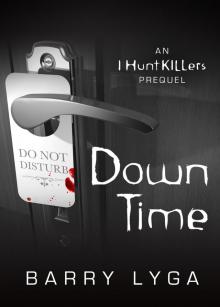 Down Time
Down Time Blood of My Blood
Blood of My Blood Goth Girl Rising
Goth Girl Rising Archvillain
Archvillain Boy Toy
Boy Toy Game
Game Bang
Bang The Legends of Forever
The Legends of Forever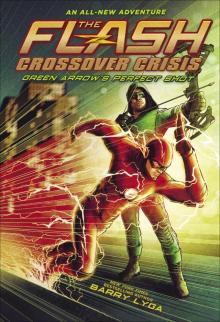 The Flash: Green Arrow's Perfect Shot
The Flash: Green Arrow's Perfect Shot The Flash: The Tornado Twins
The Flash: The Tornado Twins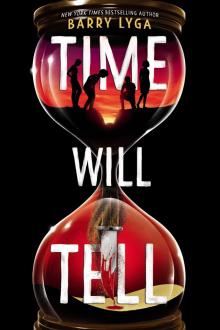 Time Will Tell
Time Will Tell The Secret Sea
The Secret Sea The Hive
The Hive Career Day
Career Day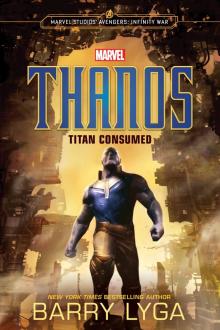 MARVEL's Avengers: Infinity War: Thanos
MARVEL's Avengers: Infinity War: Thanos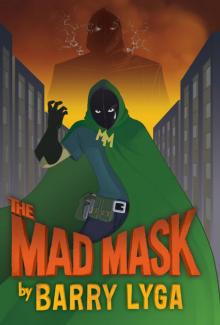 The Mad Mask
The Mad Mask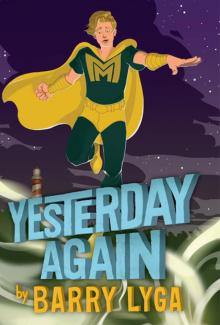 Yesterday Again
Yesterday Again I Hunt Killers
I Hunt Killers Blood Boy
Blood Boy Neutral Mask
Neutral Mask The Astonishing Adventures of Fanboy and Goth Girl
The Astonishing Adventures of Fanboy and Goth Girl I Hunt Killers Neutral Mask
I Hunt Killers Neutral Mask Neutral Mask: an I Hunt Killers prequel
Neutral Mask: an I Hunt Killers prequel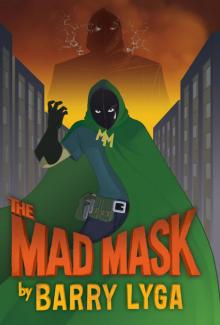 Mad Mask
Mad Mask Blood Boy: an I Hunt Killers prequel
Blood Boy: an I Hunt Killers prequel I Hunt Killers Blood Boy
I Hunt Killers Blood Boy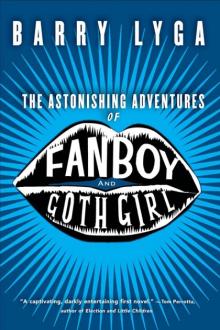 The Astonishing Adventures of Fan Boy and Goth Girl
The Astonishing Adventures of Fan Boy and Goth Girl